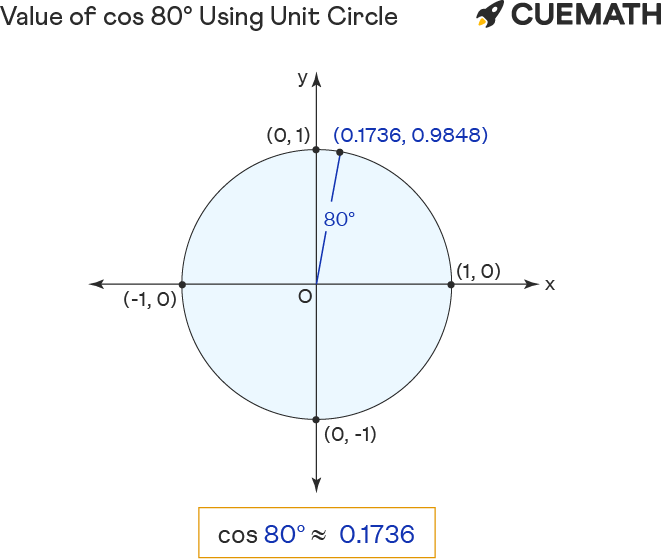Cos 80 Degrees
The value of cos 80 degrees is 0.1736481. . .. Cos 80 degrees in radians is written as cos (80° × π/180°), i.e., cos (4π/9) or cos (1.396263. . .). In this article, we will discuss the methods to find the value of cos 80 degrees with examples.
- Cos 80°: 0.1736481. . .
- Cos (-80 degrees): 0.1736481. . .
- Cos 80° in radians: cos (4π/9) or cos (1.3962634 . . .)
What is the Value of Cos 80 Degrees?
The value of cos 80 degrees in decimal is 0.173648177. . .. Cos 80 degrees can also be expressed using the equivalent of the given angle (80 degrees) in radians (1.39626 . . .)
We know, using degree to radian conversion, θ in radians = θ in degrees × (pi/180°)
⇒ 80 degrees = 80° × (π/180°) rad = 4π/9 or 1.3962 . . .
∴ cos 80° = cos(1.3962) = 0.1736481. . .

Explanation:
For cos 80 degrees, the angle 80° lies between 0° and 90° (First Quadrant). Since cosine function is positive in the first quadrant, thus cos 80° value = 0.1736481. . .
Since the cosine function is a periodic function, we can represent cos 80° as, cos 80 degrees = cos(80° + n × 360°), n ∈ Z.
⇒ cos 80° = cos 440° = cos 800°, and so on.
Note: Since, cosine is an even function, the value of cos(-80°) = cos(80°).
Methods to Find Value of Cos 80 Degrees
The cosine function is positive in the 1st quadrant. The value of cos 80° is given as 0.17364. . .. We can find the value of cos 80 degrees by:
- Using Trigonometric Functions
- Using Unit Circle
Cos 80° in Terms of Trigonometric Functions
Using trigonometry formulas, we can represent the cos 80 degrees as:
- ± √(1-sin²(80°))
- ± 1/√(1 + tan²(80°))
- ± cot 80°/√(1 + cot²(80°))
- ±√(cosec²(80°) - 1)/cosec 80°
- 1/sec 80°
Note: Since 80° lies in the 1st Quadrant, the final value of cos 80° will be positive.
We can use trigonometric identities to represent cos 80° as,
- -cos(180° - 80°) = -cos 100°
- -cos(180° + 80°) = -cos 260°
- sin(90° + 80°) = sin 170°
- sin(90° - 80°) = sin 10°
Cos 80 Degrees Using Unit Circle

To find the value of cos 80 degrees using the unit circle:
- Rotate ‘r’ anticlockwise to form 80° angle with the positive x-axis.
- The cos of 80 degrees equals the x-coordinate(0.1736) of the point of intersection (0.1736, 0.9848) of unit circle and r.
Hence the value of cos 80° = x = 0.1736 (approx)
☛ Also Check:
Examples Using Cos 80 Degrees
-
Example 1: Find the value of 2 cos(80°)/3 sin(10°).
Solution:
Using trigonometric identities, we know, cos(80°) = sin(90° - 80°) = sin 10°.
⇒ cos(80°) = sin(10°)
⇒ Value of 2 cos(80°)/3 sin(10°) = 2/3 -
Example 2: Using the value of cos 80°, solve: (1-sin²(80°)).
Solution:
We know, (1-sin²(80°)) = (cos²(80°)) = 0.0302
⇒ (1-sin²(80°)) = 0.0302 -
Example 3: Simplify: 4 (cos 80°/sin 170°)
Solution:
We know cos 80° = sin 170°
⇒ 4 cos 80°/sin 170° = 4 (cos 80°/cos 80°)
= 4(1) = 4

FAQs on Cos 80 Degrees
What is Cos 80 Degrees?
Cos 80 degrees is the value of cosine trigonometric function for an angle equal to 80 degrees. The value of cos 80° is 0.1736 (approx)
How to Find the Value of Cos 80 Degrees?
The value of cos 80 degrees can be calculated by constructing an angle of 80° with the x-axis, and then finding the coordinates of the corresponding point (0.1736, 0.9848) on the unit circle. The value of cos 80° is equal to the x-coordinate (0.1736). ∴ cos 80° = 0.1736.
What is the Value of Cos 80 Degrees in Terms of Cot 80°?
We can represent the cosine function in terms of the cotangent function using trig identities, cos 80° can be written as cot 80°/√(1 + cot²(80°)). Here, the value of cot 80° is equal to 0.17632.
How to Find Cos 80° in Terms of Other Trigonometric Functions?
Using trigonometry formula, the value of cos 80° can be given in terms of other trigonometric functions as:
- ± √(1-sin²(80°))
- ± 1/√(1 + tan²(80°))
- ± cot 80°/√(1 + cot²(80°))
- ± √(cosec²(80°) - 1)/cosec 80°
- 1/sec 80°
☛ Also check: trigonometry table
What is the Value of Cos 80° in Terms of Cosec 80°?
Since the cosine function can be represented using the cosecant function, we can write cos 80° as [√(cosec²(80°) - 1)/cosec 80°]. The value of cosec 80° is equal to 1.01542.
visual curriculum